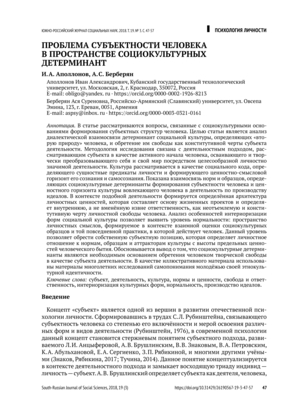Abstract
The paper deals with the issues related to socio-cultural foundations of human subject structures formation. The aim of the paper is to analyze the dialectical relationship between the determinants of social culture that determine Man’s “second nature” and attainment of freedom – a constituent characteristic of actor. The methodology of the research is based on the activity approach that regards Man as actor who masters and transforms himself and his world through rational and significant personal activity. Culture isregarded as a social code that determines essential predicates of an individual and shapes the axiological level of his consciousness and self- consciousness. The paper features the interrelation between the norms and the patterns that act as socio-cultural determinants of human subjectivity formation and serve as value-based level of culture that helps Man generate ideals. Within this activity, a specific set of personal values — those that make up the basis of life and determine integral, not imposed, responsibility as an inherent and basic characteristic of personality freedom, is shaped. Interiorization analysis of social culture forms allows to reveal the level of “normalcy” in the area of personal cultural meaning and personal meaning formed against the background of mutual evaluation of socio-cultural patterns and Man’s everyday life. As a result, it becomes possible to obtain actor’s own s attitudewhich determines Individual’s attitude to norms and patterns and cultural attractors from the peak of ultimate values of Man’s being. The author of the research substantiates the conclusion that socio-cultural determinants are necessary grounds for Man as actor to acquire freedom of constructive endeavor. The research contains materials of long-standing that illustrate how young people self-comprehend their ethno-cultural identity.
Keywords
References
Анцыферова, Л.И. (2000). Психологическое содержание феномена субъект и границы субъектно-деятельностного подхода. В А.В. Брушлинский, М.И. Воловикова, В.Н. Дружинина (ред.) Проблема субъекта в психологической науке (с. 27–42). М.: Академический проспект.
Аполлонов, И.А., Карнаушенко, Л.В., Тучина, О.Р. (2009). Этнокультурные нормы и ценности в формировании самопонимания молодежи (на примере русских и адыгских студентов кубанских вузов). Краснодар: Изд-во КрУ МВД РФ.
Бахтин, М.Н. (2008). Философия как живой опыт. Избранные статьи. Москва: Лабиринт.
Брушлинский, А.В. (2003). Психология субъекта. Москва: Институт психологии РАН.
Гофман, И. (2003). Анализ фреймов: эссе об организации повседневного опыта. Москва: Институт социологии РАН.
Знаков, В.В., Рябикина, З.И. (2017) Психология человеческого бытия. Москва: Смысл.
Зинченко, В.П. (2001). Психологическая теория деятельности. Вопросы философии, 2, 81–83.
Леонтьев, Д.А. (1996). Ценность как междисциплинарное понятие: опыт многомерной реконструкции. Вопросы философии, 4, 15–26.
Мамардашвили, М.К. (1996). Необходимость себя. Москва: Лабиринт.
Михайлов, Ф.Т. (2002). Проблема «subject-Object» или поиск субъектом своих предикатов. В Субъект. Познание. Деятельность (c. 377–398). Москва: Канон+ ОИ «Реабилитация».
Петровский, В.А. (2010). Человек над ситуацией. Москва: Смысл.
Резвых, П.В. (1996). Бытие, сущность и существование в поздней онтологии Г.В.Й. Шеллинга (к шеллинговской постановке проблемы творения). Вопросы философии, 1, 110–123.
Резник, Ю.М. (2009). Человек за границами культуры и социальности: трансперсональность как предмет социальной теории (метафизические основания). Вопросы социальной теории, 1 (3), 17–195.
Рубинштейн, Л.С. (1997). Избранные философско-психологические труды. Основы онтологии, логики и психологии. Москва: Наука.
Рубинштейн, С.Л. (1976). Проблемы общей психологии. Москва: Просвещение.
Рябикина, З.И. (2005). Личность как субъект бытия и со-бытия: психологический аспект анализа. В Личность и бытие: субъектный подход. Личность как субъект бытия: теоретико-методологические основания анализа (с. 5–21). Краснодар: КубГУ.
Тульчинский, Г.Л. (2007). Свобода — эпифеномен культуры? http://hpsy.ru/public/x2919.htm
Тучина, О.Р. (2013). Самопонимание личностью своей этнокультурной идентичности: субъектно-бытийный подход. Краснодар: КубГУ.
Филер, А.Я. (2012). Науки о культуре после постмодерна. Постфутурология. Обсерватория культуры, 2, 4–11.
Bugental, J.F.T., Kleiner, R. (1993). Existential Psychotherapies. In G. Stricker, L. Gold (Eds.) Comprehensive Handbook of Psychotherapy Intergration. New York: Plenum Press.
Campbell, R.L., Christopher, J.C., & Bickhard, M.H. (2002). Self and values: An interactivist foundation for moral development. Theory & Psychology, 12, 795–823.
Martin, J. (2004). Self-Regulated Learning, Social Cognitive Theory, and Agency. Educational Psychologist, 39 (2), 135–145.
Sugarman J., Martin, J. (2011). Theorizing Relational Agency: Reactions to Comments. Journal of Constructivist Psychology, 24 (4), 321–323.


